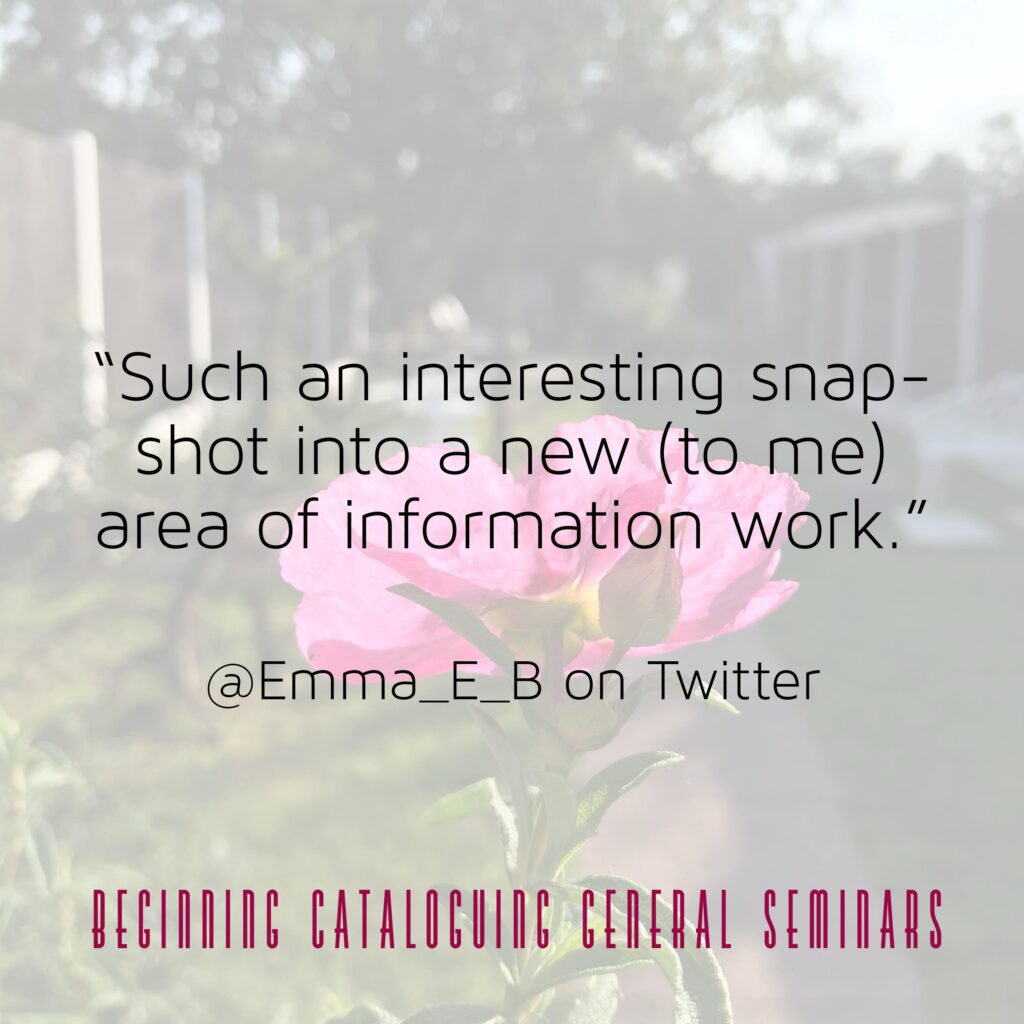
Our General Seminars aim to provide cataloguers and other interested information workers with insights from colleagues working in metadata and beyond.
In this event report, Dr Veronica Pizzarotti (University of Manchester) shares some thoughts on Dr Katharine Schopflin’s recent seminar on organisational knowledge.
I found the Organisational Knowledge seminar delivered by Dr Katharine Schopflin in February very useful and informative. From the very beginning of her presentation I realised very clearly that I did not really have an accurate idea of what Knowledge Management is.
Katharine’s presentation was very engaging and applicable to every organisation as, using her words, Knowledge Management is everywhere. It is centred on people and goes above and beyond the organisation of information. As the event summary on the Beginning Cataloguing blog puts it, “Knowledge Management claims to be the art of making organisations perform better by finding and exploiting employee knowledge and expertise and controlling the information they produce”.
A few examples where Knowledge Management is employed in an organisation are websites, directories, company drives. It is helped by technology, but technology alone is not sufficient for an effective Knowledge Management policy and engagement.
Katharine explained why it is important to manage knowledge. Effective Knowledge Management enables employees of an institution or company to find out the processes underpinning every aspect of their organisation. This is very effective in combating the ‘silo effect’: in today’s organisations people tend to focus on their own job and do not necessarily have the resources and time to engage with different departments, leading to individuals not having a clear idea of what other employees do and, in a similar way, people at the top of the managerial hierarchy do not necessarily know the details of what their departments do. The implementation of robust and effective Knowledge Management policies requires a culture change that will not happen quickly and can only happen if people in leadership start it by leading by example.
Katharine explained that it is common for organisations to employ knowledge managers but at the same time she stressed the importance of collective responsibility and how everybody can be a knowledge manager in their place of work. How to be a Knowledge Manager? Katharine provided examples of knowledge management activities that everybody is probably already doing without realising it. A few of these quick wins are: knowledge sharing in the workplace, projects showcases, clear links between activities and organisational priorities, and events.
Katharine concluded her presentation with a few aspirations that I re-write here as a takeaway for myself and the readers of the blog: an intranet, new starters process, projects follow up and transfer, active communities of practice, knowledge tools to help people work. These examples portray really well the interdependence between technology and peoples’ behaviours that was a recurrent theme throughout the whole presentation. I used the examples and tips provided to reflect on my role as an information professional and within my organisation, how I relate to colleagues in my team and in the rest of the library, my own knowledge sharing practices and how to make them more effective. Katharine’s talk also made me see some interactions with colleagues in a different light and has been extremely useful in making me more proactive bringing forward new ideas. This process of self-reflection has also highlighted some areas (in both my personal and professional life) I’d like to work on, and suggested ways to do so. Thank you, Katharine, for giving me so much food for thought!
The next in the General Seminar series is also led by one of our Associates: in ‘Creative Digital Experiments with Collections’ on 21 April, Ash Green will share a variety of inspiring examples and highlight how online mapping and narrative tools can provide visitors with a new digital route into your collections. Do join us if you can.